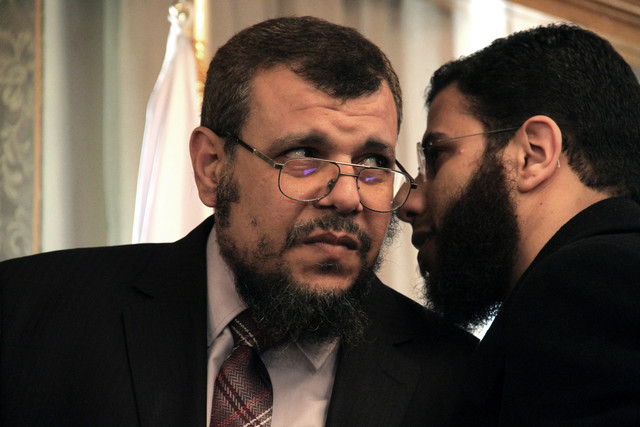
Political news from Egypt over the past week has been dominated by reports of tensions between the Muslim Brotherhood and the Salafist Nour Party (centered around the dismissal of presidential advisor Khalid Alam El Din), as well as by news of meetings between members of the leadership of the Freedom and Justice party and the National Salvation Front, including Saad El Katatni and Mohamed ElBaradei. Below are a few highlights of commentary from the Egyptian media on these developments.
Brotherhood stubbornness, Nour opportunism and NSF confusion
Writing in al-Masry al-Youm, Hassan Nafi’a asks if this recent shake-up of presidential advisors has any meaning beyond the normal political games that “Egyptians have become accustomed to.” While acknowledging that only time will tell if these events have any enduring significance, he writes that one thing is for certain:
“(T)he policies pursued by all three sides are not reassuring. The policies of the Freedom and Justice Party remain simultaneously characterized to a large degree by self-importance, stubbornness, and stupidity. The policies of the Nour Party, whose stance towards tourism and the implementation of Islamic law have caused complications in the Egyptian political scene, display clear opportunism. Lastly, the policies of the Salvation Front are visibly confused, disconnected from the pulse of the street, and to a large degree lack coherence.”
In al-Shorouk, Emad al-Din Hussein sees clear political goals behind this recent jockeying on the part of the Muslim Brotherhood, especially in light of the approaching parliamentary elections. He writes:
"In my estimation the essential goal of the Brotherhood is to gain a stamp of approval from the leadership of the Salvation Front – or at least a majority of them – for the sake of a political arrangement. This will culminate in a photo-op in front of the presidential palace which will then be marketed internationally and used to secure a loan from the International Monetary Fund, and afterwards employed to regain some of the legitimacy that the regime has lost in recent weeks."
Why Did Katatni Meet with the ‘agent’ Elbaradei?
In al-Tahrir however, Osama Salama sees confusion on the part of the Brotherhood and the Freedom and Justice Party, sarcastically pointing out that El Katatni is meeting with a leading opposition figure who – as Salama writes – has been vilified in the Brotherhood-affiliated media, and is the target of a politically motivated official investigation. Addressing El Katatni, he says “Don’t confuse your supporters!”:
“How will (members of the Muslim Brotherhood and supporters of the FJP) reply if somebody asks them: Why did your leaders and leadership meet with (ElBaradei)? Will they say that it was just a friendly visit on the occasion of Valentine’s Day? Or that they have suddenly discovered that he is a patriotic man who played a prominent role in the prelude to the glorious January revolution…?”
Andrew Ver Steegh is a graduate student at the University of Chicago. He was a Fulbright Fellow in Egypt in 2010-2011.
Photo: AP
Image: Khaled%20Alam%20Eldin%20AP.jpg
